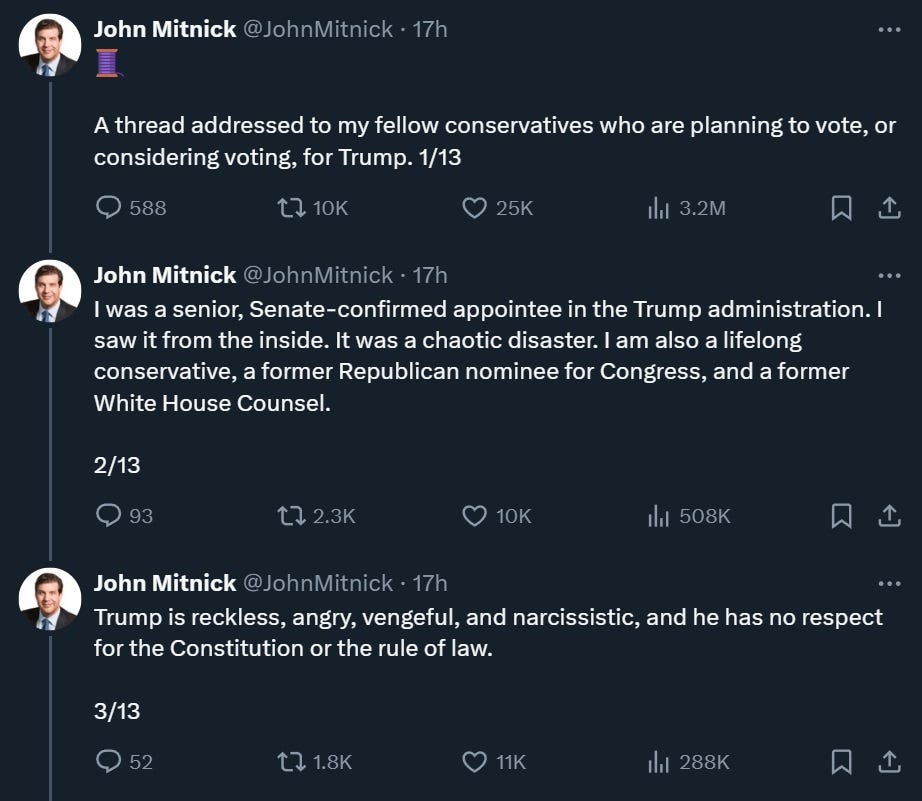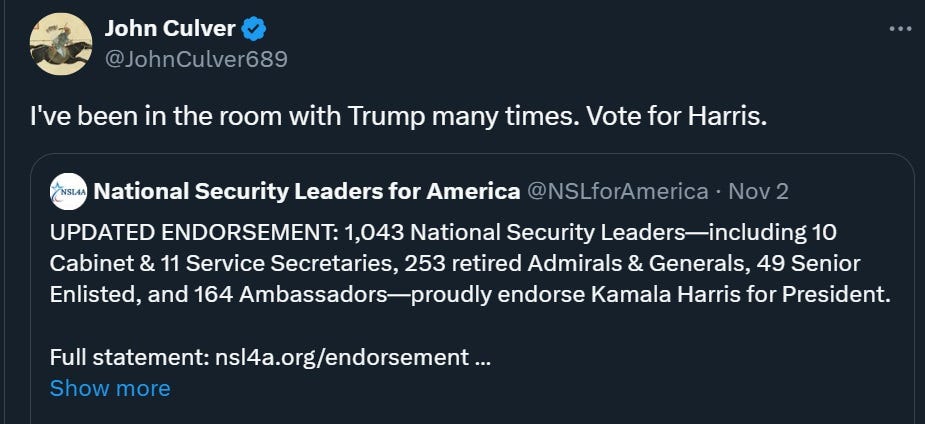Four reasons not to vote for Trump, and four reasons to vote for Harris
Summing up my thoughts on the 2024 election.

I always try to assess facts as objectively as I can, and I always present my view of the world openly and honestly. But this is not a neutral or nonpartisan blog. I strongly endorse Kamala Harris for President, and I think the Democrats — despite some flaws — are a better choice than the Republicans at this moment in history.
Instead of pretending like I don’t have a strong opinion about this, what I try to do is to explain why I have such a strong opinion, and how I came to my conclusions. I realize that some of my readers aren’t going to agree with my reasoning, and that’s fine — I’m not going to come throw eggs at your house, or scream at you in a restaurant. Even people who disagree with me deserve to know how I think about the issues facing our country.
I’ve written quite a lot about the 2024 presidential election, and I think I’ve managed to pretty much cover every issue that I think is important, and lay out every key argument that I have. So instead of writing it all again, in this post I’m just going to link to what I’ve written before, along with some brief summaries. I’ve condensed my arguments into four reasons not to vote for Donald Trump, and four reasons to vote for Kamala Harris.
Four reasons NOT to vote for Donald Trump
1. A Trump victory will help America’s enemies at a crucial moment
Regular readers know that my biggest worry in the world right now is Cold War 2. China’s unrivaled manufacturing prowess, combined with its decision to oppose the U.S. and to support Russia, North Korea, and Iran, means that the free world now faces the most powerful coalition of opponents that we have ever faced.
I believe that the next decade will be pivotal in the competition between the free world and the China-led “New Axis”. If deterrence fails, China will conquer Taiwan, Russia will conquer substantial parts of East Europe, and our key allies — Japan, Germany, South Korea, France, the UK, etc. — will become dominated by China and Russia. China and its proxies will then do whatever they can to weaken the U.S. economically and socially, in order to prevent the resurgence of an America-led anti-authoritarian coalition. But if deterrence succeeds, I believe that democratic systems have fundamental long-term strengths that will outlast the temporary appeal of authoritarian empires.
Whoever wins tomorrow’s election will be the free world’s most important leader during its greatest hour of crisis in almost a century:
The free world teeters on the edge of a knife
This is not a post that I ever wanted — or, to be honest, expected — to write. I am an optimist by nature, and I am also not an expert on geopolitics. And yet the trends are so obviously dire, and so few people seem to recognize the danger, that I feel like I have to keep sounding the alarm and hoping that someone out there is listening.
And I believe that Donald Trump’s actions show that he is exactly the wrong person to lead us into this pivotal moment. Not only does he repeatedly declare that “the enemy from within” is more important than China and Russia, but this attitude is matched by his actions. Trump routinely and predictably opposes every policy that would strengthen America and its allies against the threat posed by China and its proxies — the CHIPS Act, America’s alliances, TikTok divestment, and so on:
Why on Earth does Trump want to cancel the CHIPS Act??
I wasn’t planning to write another post about Trump and China. But then a student journalist named Luke Radel asked House Speaker Mike Johnson whether he and Trump will repeal the CHIPS Act if Trump wins the election, and Johnson said yes:
That doesn’t mean Kamala Harris will be a paragon of Rooseveltian resolve. She’s a bit of an unknown quantity on foreign policy, and I do worry that she’ll fail to take the authoritarian threat as seriously as Biden has. She could end up being great, but I’m not positive she will. But that lingering uncertainty is nothing compared to the knowledge that Trump will definitely do everything in his power to refocus America on internal conflicts and ignore the enemies that threaten us overseas.
As I see it, this is the single most important issue in this election.
2. The best people hate Trump, and the worst people become Trump’s allies
One notable feature of Trump’s campaign is that principled, competent people tend to either avoid Trump or to try working for him and then quit in disgust, while cranks, charlatans, criminals, and bad actors of all kinds seem to gravitate to his movement:
Trumpism is kakistocracy
One particularly noteworthy thing about Donald Trump is how almost all of the people who work for him seem to end up hating him. When Trump was in office the first time, he hired a bunch of military and ex-military men (despite being a draft dodger himself). Almost all of these men ended up despising him…
It seems like every day, more people who worked with Trump denounce him, and plead with the country not to send him back to the White House. Even in the two days since I wrote my post about “kakistocracy”, I’ve seen more of these. Here’s John Mitnick, who was General Counsel for the DHS under Trump:
And here’s John Culver, a former National Intelligence Officer under Trump:
This is on top of similar denunciations from Trump’s Chief of Staff, both of his Secretaries of Defense, his Vice President, his top generals and national security advisors, and many others.
Meanwhile, the people who have joined Trump’s campaign or remained fiercely loyal to him include antivaxxers like RFK Jr., pro-Russian shills like Tulsi Gabbard, and various criminals hoping for pardons.
Personnel is incredibly important — not just because of what it indicates about a leader himself, but because those are the people who will actually be running pieces of the country if Trump wins. Trump’s advanced age and failing concentration mean that his personnel choices will be even more influential and important — just as Biden’s were.
3. Trump is a force for social unrest
Some people — including some right-wingers — have argued against a second Trump presidency on the grounds that it would rile up the forces of wokeness, which have been on the wane since Biden has been in office. I do not make this argument. In fact, I expect wokeness to continue to decline in energy and popularity whether Trump or Harris is elected.
But the unrest of the 2010s didn’t only come from the left; the right was also an important source of chaos and negative energy. And a Trump victory would reinvigorate the madness of the right, thus prolonging the unrest of the 2010s:
If Trump loses the election, our nation can finally rest
As always, there’s last-minute election drama. At a Trump rally at Madison Square Garden in NYC, comedian Tony Hinchcliffe referred to Puerto Rico as a “floating island of garbage”, angering many Puerto Rican voters. He also made a joke about a black person carving a watermelon for Halloween instead of a pumpkin, and said “These Latinos, they love makin…
What would that unrest look like? The most important manifestation would be relentless fighting between Trump and any national institution that might oppose his will. The most important of those institutions are the U.S. Military, the judiciary, the electoral system, and the Federal Reserve:
A vote for Trump is a vote for chaos
Noahpinion is not a nonpartisan or politically neutral blog. I don’t especially enjoy writing about politics, but sometimes I feel it’s necessary. If that makes you mad, I’m sorry. In order to get good policies that help the people of the United States, the United States needs to elect the best leaders possible, and I have opinio…
And remember, of course, that Trump has never backed off of his denial of the 2020 election result, has promised to pardon the people who stormed Congress on January 6th on his behalf, and is preparing to deny the results of this 2024 election if he loses.
I do not want to see the President trying to weaken the military, the judiciary, the electoral system, and the Fed for four long years. I do not want a President who tries to overturn free and fair elections, including with the rewarding and condoning of violence against Congress. Those things are all very bad for America.
The second manifestation of Trumpian unrest will be relentless demonization and scapegoating of immigrants. Trumpism is, first and foremost, an anti-immigrant movement, and Trump’s false accusations against Haitians in September — followed swiftly by less-publicized but equally false accusations against Venezuelans in October — give a preview of what the next four years could be like under Trump:
The dark vision of America
I’m sorry, I know I already wrote about this last week. But I just can’t let this one go. If I’m repeating myself, I apologize, but this is very important.
Relentless attacks on American institutions and on immigrants will outrage many Americans — not because of wokeness or leftism, but because they are counter to basic American values and beliefs. If Trump gets elected and these things start dominating the airwaves and the public conversation again, Americans will remember why the 2010s were so exhausting. Personally, I’ve had quite enough of that.
4. Trump’s economic policies range from mediocre to bad
Trump’s economic policies are basically just 1) mass deportation, 2) tariffs, 3) tax cuts, and 4) low interest rates to support tax cuts. I expect mass deportation to be mildly negative for the economy, but not enough so that most people notice the effects. I expect tariffs to mostly be canceled out by exchange rate appreciation, and for the harm to fall mostly on U.S. manufacturers who will find it hard to source components.
But Trump’s plans for tax cuts will create big deficits. And his intent to force the Fed to cut interest rates to allow him to finance those deficits, if successful, could lead to significantly higher inflation:
Realistically, how much damage could Trump do to the U.S. economy?
Despite seemingly daily revelations of new scandals and a wave of denunciations from almost everyone who served under him in his first term, Donald Trump is still the front-runner in the upcoming presidential election. I think Trump is extraordinarily dangerous in terms of his foreign policy — by abandoning allies, he’ll fracture the “free world” coalit…
Now, it’s worth noting that Elon Musk, one of Trump’s allies, has promised deep spending cuts — probably on health care and the military — to counterbalance the tax cuts. This would be less irresponsible than simply doing tax cuts alone, but it would hurt the macroeconomy in the short term (“temporary hardship”) while making America more unequal in the long run:
This is not to say that Trump’s economic policies would be purely negative. I’m sure his appointees would be deeply unfriendly to regulation (though they’d be unlikely to address land use regulation, which is by far the most important kind). And much higher tariffs on China, though no substitute for industrial policy, would help force Chinese companies to invest abroad to avoid the tariffs, thus benefitting countries like Vietnam and Indonesia (which I doubt Trump voters care about, but which I do care about). But overall, Trump’s main economic agenda ranges from mildly negative to outright worrying. The opposition to Fed independence is really the most concerning part here.
Four reasons TO vote for Kamala Harris
1. Biden has been effective, and Harris would continue Biden’s approach
Harris isn’t an incumbent, but she’s a quasi-incumbent. She’s unlikely to reverse any major pieces of Biden’s policies, and she could be expected to govern in a broadly similar manner.
And when I look at how Biden and his administration have governed over the last four years, I generally like what I see. The Dems have been mostly diligent and fairly effective at solving the problems of the post-pandemic period:
Democrats fixed many of the problems of the early 2020s
There’s a debate out there over whether politicians should focus on doing policies that are popular or policies that deliver tangible results to voters. These approaches sometimes go by the name of “popularism” and “deliverism”. Personally, I’ve always been skeptical of the idea tha…
When Biden took office, the nation was still suffering a recession from the pandemic and a massive crime wave from the unrest of summer 2020. But under Biden, starting in late 2021, the crime wave was defeated, and unemployment was defeated. The conquest of unemployment came at the cost of somewhat higher inflation, adding to external factors that drove prices up. But starting in 2022, Biden successfully defeated the post-pandemic inflation — reappointing a tough Fed chair who vowed to raise interest rates, opening up an unprecedented amount of oil drilling to reduce oil prices, and ending pandemic relief spending.
The result of all this has been a U.S. economy that’s probably the best since the late 1990s:
Let us pause to appreciate the remarkable U.S. economy
Last July, I wrote a post called “If this is a bad economy, please tell me what a good economy would look like”. At that time, there was still quite a lot of debate about whether the U.S. economy was doing well. As of October 2024, “the economy is good” is much less of a bold thesis. Even Fox News, which is generally loa…
Often, good economies are the result of favorable circumstances that have little to do with presidential policies. But the U.S. economy was in such a bad state in 2021 that Biden has to get an unusual amount of the credit this time around. This was more than just competent stewardship — Biden vigorously attacked our problems, and he generally beat them. In fact, in 2023, the Biden administration acted quickly to prevent a banking crisis — a victory so swift and decisive that few even remember it now.
Even on the one policy where Dems took way too long to take action — the border crisis — Biden eventually proved responsive to public opinion, cracking down on asylum claims and stanching the flow of illegal border crossings.
I believe that Democrats broadly deserve to be rewarded for all of this competence and responsiveness. Harris isn’t Biden, but she was in the administration for all of this time, and has many of the same people around her. It just doesn’t make sense to switch horses in the middle of a run this good.
2. The Harris campaign has marginalized the extremists within the Democratic party, and brought the party back toward patriotism and optimism
The 2010s were a time of deep unrest in American society, and both the right and the left were sources of that unrest. But people don’t seem to understand just how decisively the Harris campaign has moved the Democrats away from the extremism on the left. She marginalized the Palestine protesters at her convention, and released an economic program that has few if any aspects of the socialist agenda.
But most importantly, Harris has brought patriotism back:
The Democrats embraced patriotism after all
Anyone watching the Democratic convention in Chicago right now must be struck by the intense patriotism on display. American flags are everywhere. Convention-goers hold up signs saying “USA”. The delegate roll call celebrated every state in turn. A montage showed triumphant scenes
The “woke” progressivism of the late 2010s often questioned or even denied the idea that America was a nation founded on freedom, and in some progressive circles it became almost taboo to defend America’s founding or its fundamental ideals. As soon as Kamala Harris took over from Joe Biden as the Democratic candidate, however, there was a pronounced shift back toward the patriotic consensus that prevailed in earlier decades. Consider one of Harris’ most recent campaign ads:
The words, which were taken from one of Harris’s recent speeches, are:
Nearly 250 years ago, America was born when we wrested freedom from a petty tyrant. Across the generations, Americans have preserved that freedom, expanded it, and in so doing, proved to the world that a government of, by, and for the people is strong and can endure.
That is the kind of rhetoric I grew up hearing from my leaders. It is not the kind of rhetoric I hear from Donald Trump. And it’s not the kind of rhetoric that would be embraced by most of the progressive activists of 2017. Harris is pulling her party back toward patriotism, and toward freedom as the fundamental American value.
I’m not sure if the shift toward explicit, unapologetic patriotism will be able to break through the general noise of pre-election partisan shouting. But it does seem like it’s making an impression on at least a few people, and that’s great to see:
Along with patriotism, Harris has re-embraced a general vibe optimism and positivity, much like Barack Obama and Bill Clinton did during their campaigns:
The Democrats' new sunny vibes
Three weeks ago, as Donald Trump took a clear lead in the presidential race, Tyler Cowen wrote a post enumerating nineteen reasons why the “vibes” of the race had shifted. Some of the reasons included Trump’s personal sense of humor and confident attitude, his team’s mastery of social media, the intell…
That’s the kind of attitude I think we sorely need, after the dark and troubled years of the 2010s and the pandemic.
I believe that this kind of shift deserves to be rewarded at the polls. Even if you’re a conservative or Republican who was appalled by some of the attitudes that came to dominate the progressive movement in the 2010s, it makes sense to reward Democratic leaders who pull their party back toward a full-throated, unapologetic embrace of America and freedom.
3. Industrial policy is very important and good
All of my regular readers know that I’m a big fan of industrial policy. As I wrote above, it’s crucial for America’s national security and our ability to resist China and the New Axis. But I also think it’s helpful in general to have a more balanced mix of industries — high-tech manufacturing is an important component of a diversified economy.
All my life, Presidents and other American leaders have been talking about the need to make America good at manufacturing again. Trump talked about it constantly. But no one has ever actually done it — Trump’s tariffs did absolutely nothing, and even hurt American manufacturers a little bit. Trump failed in this mission.
And yet Joe Biden has actually managed to generate a manufacturing boom in America:
Biden did stuff, and it looks like it's working so far
For the first time in its entire history, the U.S. is facing a rival that can out-manufacture it. This is a very big deal. George W. Bush and Barack Obama never seemed to recognize how big of a deal this was, and so we lost valuable decades in which we could have addressed this problem.
Factories are being built at a rapid rate, mostly in the industries that Biden has subsidized with the CHIPS Act and the Inflation Reduction Act. But almost all of the capital investment is private capital, not government subsidies — it turned out that all America needed to start building factories again was a little push.
Trump would cancel all this. But Kamala Harris will continue it, and that is a major reason to vote for her. Industrial policy represents a major change in how Americans think about what makes a good economic policy — a shift from “government versus the private sector” to public-private partnership, and a shift toward goal-oriented policies that try to plug specific holes in our economic system. It’s a shift that needs to be refined, improved upon, and carried through.
4. Harris is pro-housing and pro-entrepreneurship
So far, I’ve been talking about Harris’ economic program mainly in terms of how it’ll continue Biden’s economic policies — good macroeconomic stewardship and industrial policy. But Harris also has a number of original policy ideas that go beyond what Biden did.
Most importantly, Harris really emphasizes the need for housing abundance. Biden let the housing issue sort of slip by, generally leaving it to state-level reformers like the YIMBYs. Harris is putting it front and center, and her ideas for promoting housing are very reasonable:
Harris has the right idea on housing
Kamala Harris recently released a bunch of economic proposals, so I’ll be writing a few more posts about her ideas. I was definitely not a fan of Harris’ idea to outlaw “price gouging” at grocery stores (which, fortunately, she seems to be walking back a bit
Harris also looks likely to be more pro-business than Biden. Her economic policy plans emphasize the importance of entrepreneurship, and of cutting red tape:
Let's evaluate Kamala Harris' entire economic policy program!
When Kamala Harris replaced Joe Biden as the Democratic nominee, there were a couple of weeks when everyone (including myself) was talking about her positive, sunny “vibes”. Trump supporters responded by saying that Trump was the candidate of substance and policy, while vibes were all Harris had…
Even Harris’ most progressive initiative — stronger antitrust — is being done with an eye toward creating space for startups to thrive. That pro-entrepreneur approach is why the CEO of YCombinator is leading “Little Tech for Harris” fundraisers.
This is good. Businesses have become more Democratic over the years, and it’s good to see the Democrats reciprocating by recognizing private enterprise as the fundamental engine of our prosperity. That doesn’t mean Harris would govern as a laissez-faire Margaret Thatcher type, but it does mean that she’ll be more open to positive-sum thinking — she and her appointees won’t simply assume, as the socialist movement did in the 2010s, that anything that’s good for business must be bad for workers and consumers.
As with patriotism and optimism, this is a shift that deserves to be rewarded at the ballot box.





















For my money, yours is a contender for the best body of work about the 2024 election. (Up there with Klein's columns, Bob Woodward's WAR, and Matt Yglesias's shitposting.)
No bullshit, no filler -- just the must-read arguments.
Thank you, Noah, for posting like democracy depends on it.
For what it’s worth…I know swing voters *never* do this kind of comparison, but the extraordinary outperformance of the US compared to every other developed country, starting from a higher base, in a way that has made the US a *more* egalitarian society rather than less, should make it an absolute slam dunk for the party of government.